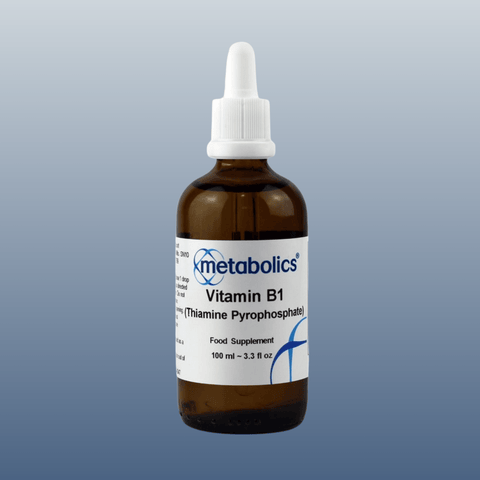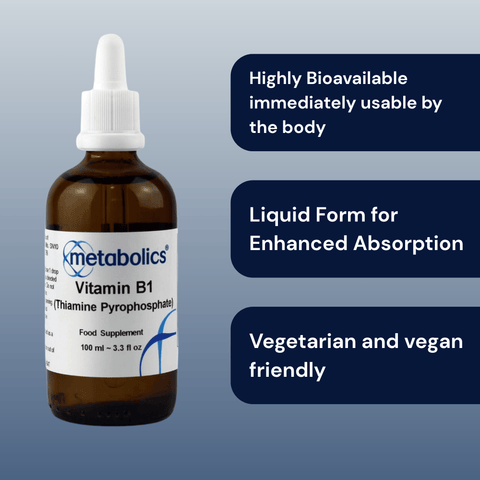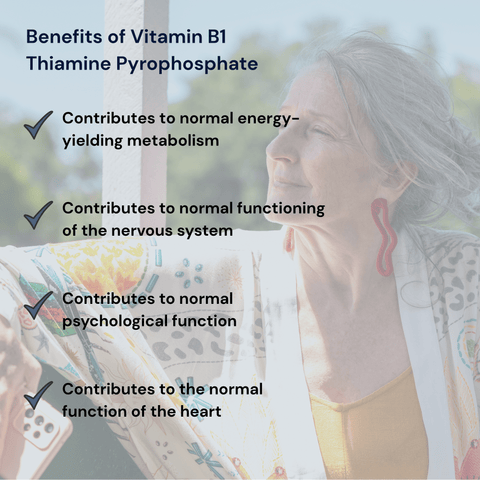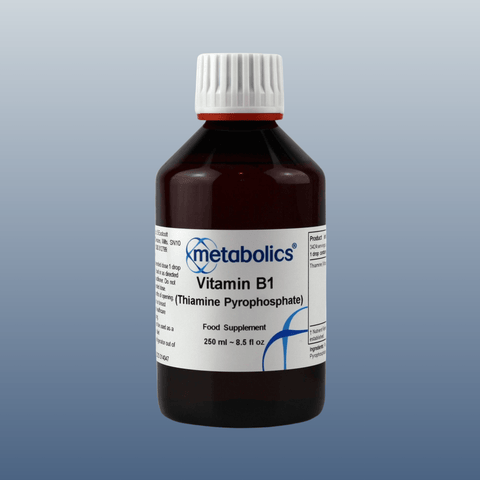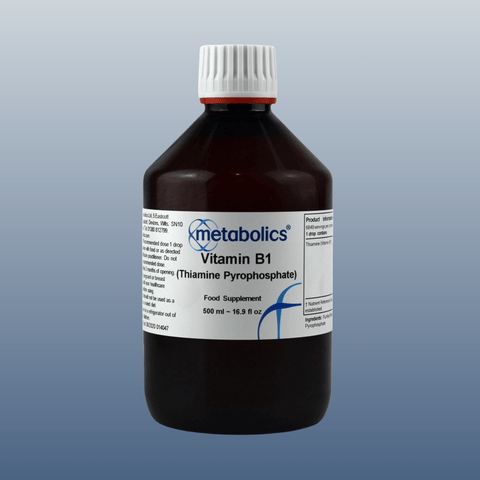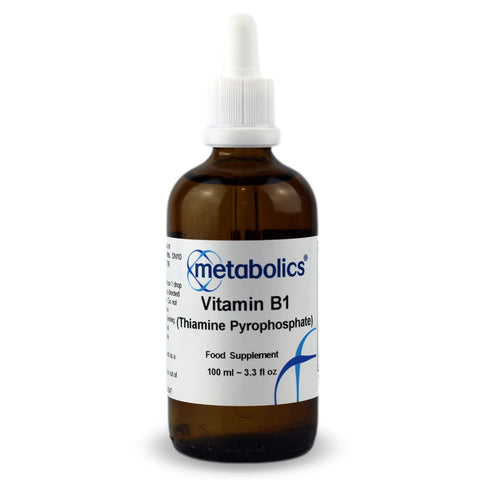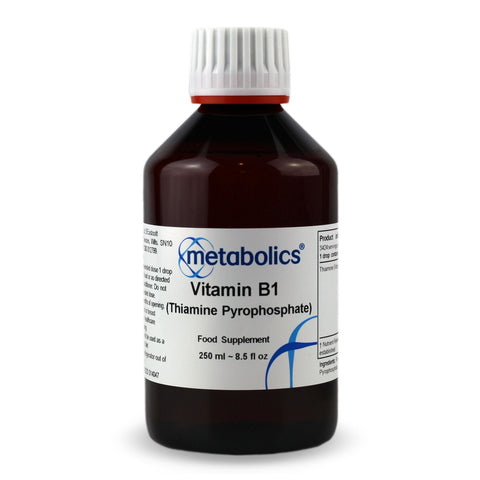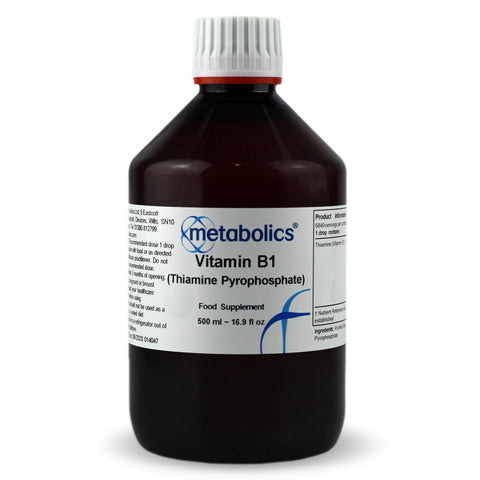Suitable For
Metabolics Vitamin B1 (Thiamine Pyrophosphate)
What Is Vitamin B1 (Thiamine Pyrophosphate)?
Vitamin B1 is also known as thiamine and is one of the eight B vitamins. In common with all the B vitamins it is water-soluble and so the body does not store it. Depletion can occur within 14 days.
Both thiamine pyrophosphate and thiamine hydrochloride (Thiamine HCl) are recognised sources of vitamin B1. However, they differ in their metabolic availability and how they function in the body.
Thiamine pyrophosphate is the active coenzyme form of thiamine, meaning it is immediately ready for use in energy metabolism and neurological function without requiring conversion. This makes it particularly useful for individuals with metabolic impairments or conditions affecting thiamine activation.
Thiamine HCl, on the other hand, is a synthetic, water-soluble form that must be converted into thiamine pyrophosphate before it can be utilised. While it is widely used in supplements due to its stability, its effectiveness depends on the body’s ability to phosphorylate it into the active form. This conversion process depends on adequate levels of magnesium, ATP, and the enzyme thiamine pyrophosphokinase.
Both forms provide essential vitamin B1, but thiamine pyrophosphate may offer faster and more efficient benefits, particularly in individuals with compromised metabolism, while thiamine HCl remains a reliable and accessible option for general supplementation.
What Is Metabolics Vitamin B1 (Thiamine Pyrophosphate) For?
Metabolics Vitamin B1 (Thiamine Pyrophosphate) provides a nutritional source of thiamine. Thiamine helps to turn food into energy and to keep the nervous system healthy. Your body is not able to make thiamine for itself.
Key Benefits of Metabolics Vitamin B1 (Thiamine Pyrophosphate)
✔ Thiamine contributes to normal energy-yielding metabolism– Thiamine acts as a coenzyme for key enzymes involved in converting food into energy. It plays a crucial role in enabling pyruvate to form Acetyl CoA (also see Metabolics Acetyl Co A Support), and alpha-ketoglutarate to form Succinyl-CoA, both of which are essential steps in the cellular energy cycle.
✔ Thiamine contributes to normal functioning of the nervous system– Thiamine is essential for the brain and nervous system. It is required by nerve cells and glial cells (supporting nervous system cells) and is involved in the production of neurotransmitters that facilitate communication between nerve cells.
✔ Thiamine contributes to normal psychological function– Thiamine is necessary for the synthesis of certain neurotransmitters, which are vital for normal psychological function, including mood regulation and cognitive processes like concentration, learning, memory and reasoning.
✔ Thiamine contributes to the normal function of the heart– Thiamine is found in high concentrations in the heart, brain, liver, and kidneys. The heart is particularly sensitive to thiamine deficiency, and a lack of thiamine can impair the function of key enzymes needed for heart and nervous system health.
Vitamin B1 Deficiency
Vitamin B1 thiamine deficiency is rare in populations where foods and cereals are fortified. However, when it does occur, it can lead to a range of symptoms, including tiredness, confusion, irritability, apathy, poor short-term memory, depression, and abdominal discomfort.
Severe deficiency can result in Wernicke-Korsakoff syndrome, a serious neurological disorder commonly seen in malnourished chronic alcoholics. This occurs because alcohol inhibits the active transport of thiamine in the small intestine, reducing its absorption. Additionally, folic acid deficiency can further impair thiamine uptake, compounding the risk of deficiency.
Who is Metabolics Vitamin B1 (Thiamine Pyrophosphate) For?
This supplement is ideal for individuals who:
✔ Require a bioavailable source of Vitamin B1 Thiamine
✔ Those experiencing fatigue, poor memory, irritability, or other signs of deficiency
✔ Individuals looking for a high-quality, active form of Vitamin B1 Thiamine
Why Choose Metabolics Vitamin B1 (Thiamine Pyrophosphate)
🔹 Highly Bioavailable –Thiamine Pyrophosphate is immediately usable by the body, requiring no conversion step
🔹 Liquid Form for Enhanced Absorption –great for those individuals who struggle to swallow pills
🔹 Pure & High-Quality– Metabolics ensures premium quality, free from unnecessary fillers and additives
Metabolics Vitamin B1 (Thiamine Pyrophosphate)
✅ Order Metabolics Vitamin B1 (Thiamine Pyrophosphate) Today! Experience the benefits of fast-acting, highly bioavailable Vitamin B1 Thiamine. Shop now and support your energy levels, nervous system, heart, and overall well-being!
Supplement Facts
1 drop contains
%NRV*
Thiamine(Vitamin B1)
389 mcg
35%
† Nutrient Reference Value (NRV*) not established
Ingredients
Directions / Dosage
 Liquid
Liquid
Warning
Storage
Product Type


